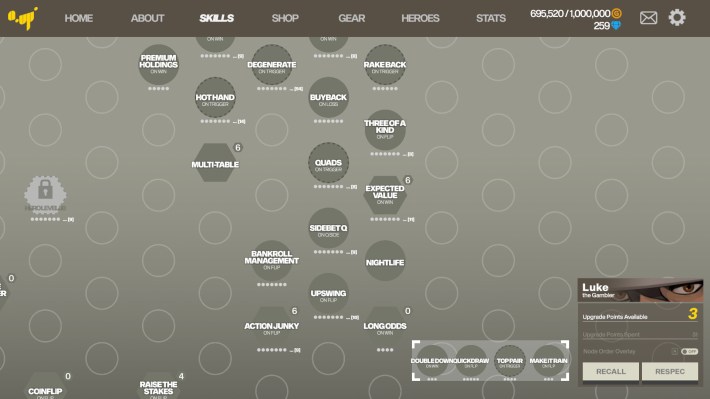Q-UP (a game whose title I literally just got while typing this sentence, humiliatingly) is the latest from the folks behind numbers-go-up game Universal Paperclips. It’s a sendup of esports, both the industry surrounding them and what the sweatiest players demand of them. It’s got a demo out now on Steam; I played it for an hour on Saturday morning and… did well? I have no idea, because I didn’t really do all that much, even though I made all the numbers go up like a damn pro.
The esport at the heart of the game, which you can play with bots or actual people, is a coin flip; you’re sorted on to team Q or team UP, and if your side of the coin comes up three times, you win. This esport bills itself as “fast, fun, fair,” with its fake developer writing that “Just like you, we’re sick and tired of the status quo of contemporary esports–long wait times, grueling games against mismatched opponents, and a ranking system that doesn’t accurately reflect the time and energy you’ve invested in the game.” There’s a meta-fiction surrounding all this, told through a fake news feed and fake emails, hyping up leagues and backend improvements and your own performance, all of it having so little to do with you actually sitting there watching a virtual coin spin around that I started to wonder if I'd ever actually done anything meaningful in a competitive game.
Unlike a round of Fortnite or Overwatch where the match is the actual game, what of Q-UP can be called a game happens in the interim. Your inbox starts filling up with emails from the game’s fictional developers, hinting at longer storylines. You earn a head-spinning amount of XP and points and currency in matches. Some of this you can apply to skills, which add effects when you win or lose or start a match, and some of which synergize based on where they are in the skill tree’s geometrically-based layout. There’s also a ton of items, purchased with in-game currency, that can boost your outcomes. At first, I totally thought all of this was fake, since it sat atop a baffling pile of jargon and conditions and relationships. And while I’m still not completely convinced it’s all real, by messing around with my skills and items I was able to make any outcome in a match a huge payout and hit the level cap the demo places on you pretty swiftly. Even though I knew this was all bullshit, it was hard not to feel proud of myself as my points and currency and rank skyrocketed, all of it shown through hugely satisfying lists and tickers and feedback.

The game’s humor is largely aimed at the esports and games industries, sending up their aesthetics and self-importance and desperate desire to force "innovation" where none exists. (I hate-love a venture capitalist whose signature is literally a line-go-up chart.) Even when it teases esports players, it reserves its real ire for the powerful figures and their structures, which prevents it from stumbling into meanness, even if I do in fact deserve to be mocked for spending far too long messing with sliders that obviously didn't do anything just because a video game presented me with sliders. Q-UP's world is compelling to hang out in even though it postures at being offputting, and its esport is somehow earnestly fun even though it is, again, just watching a fake coin flip. There’s no release date yet, but Q-UP's Steam page says it’s “coming soon.”


